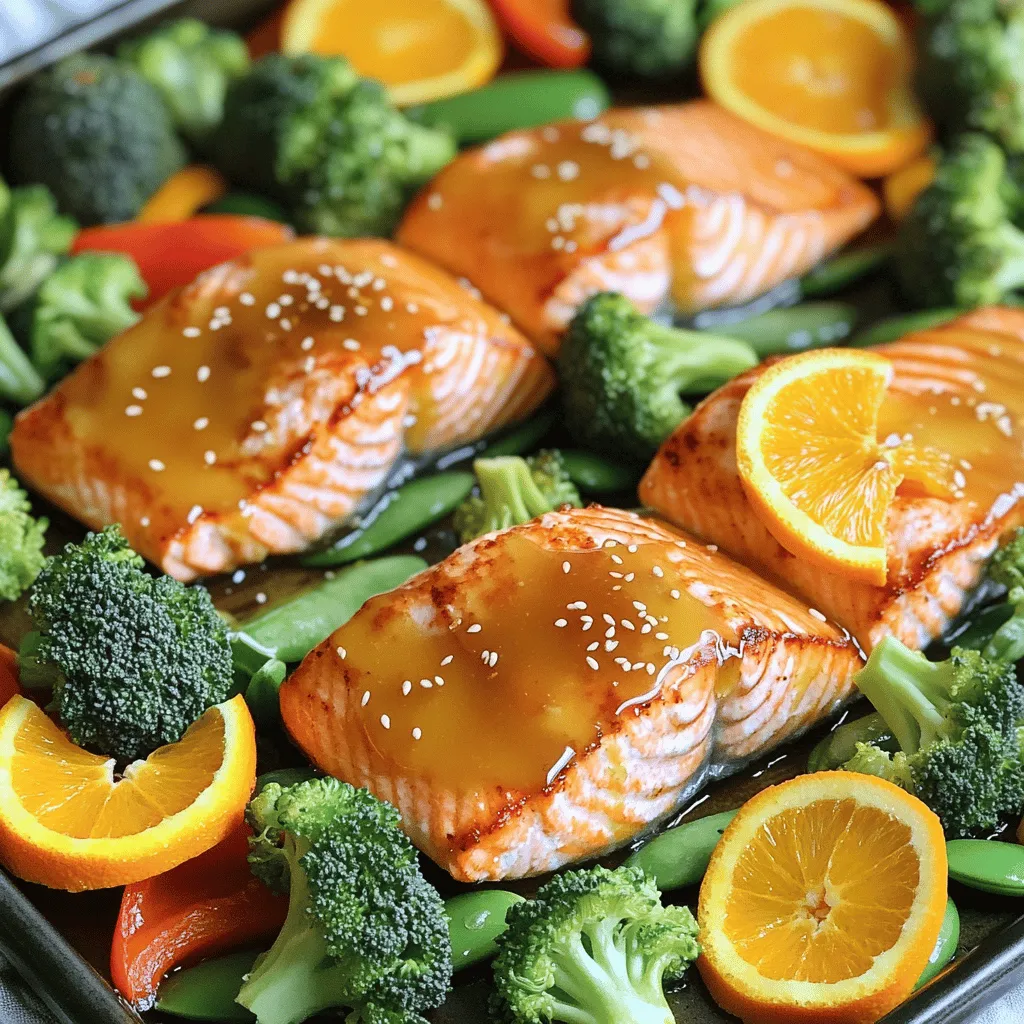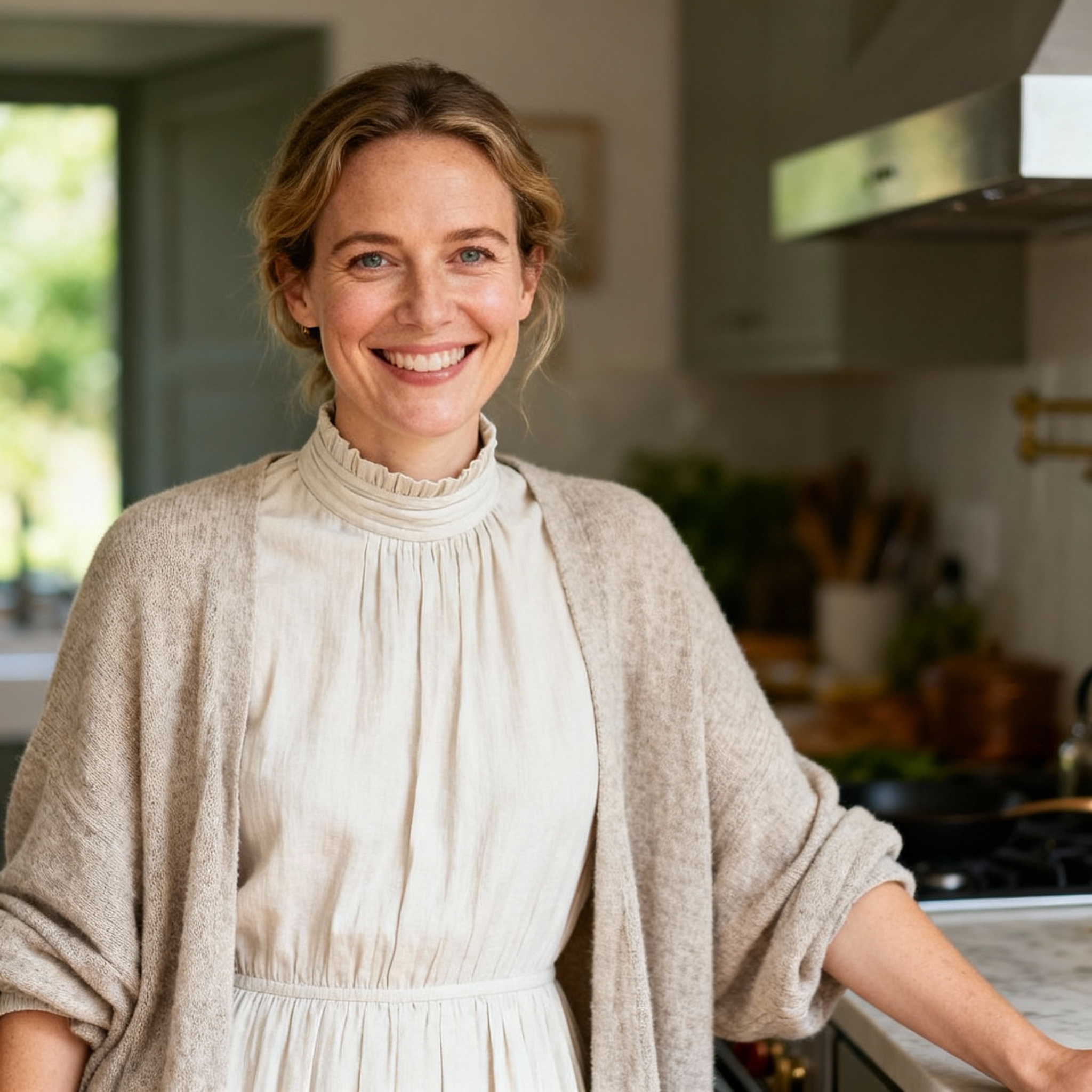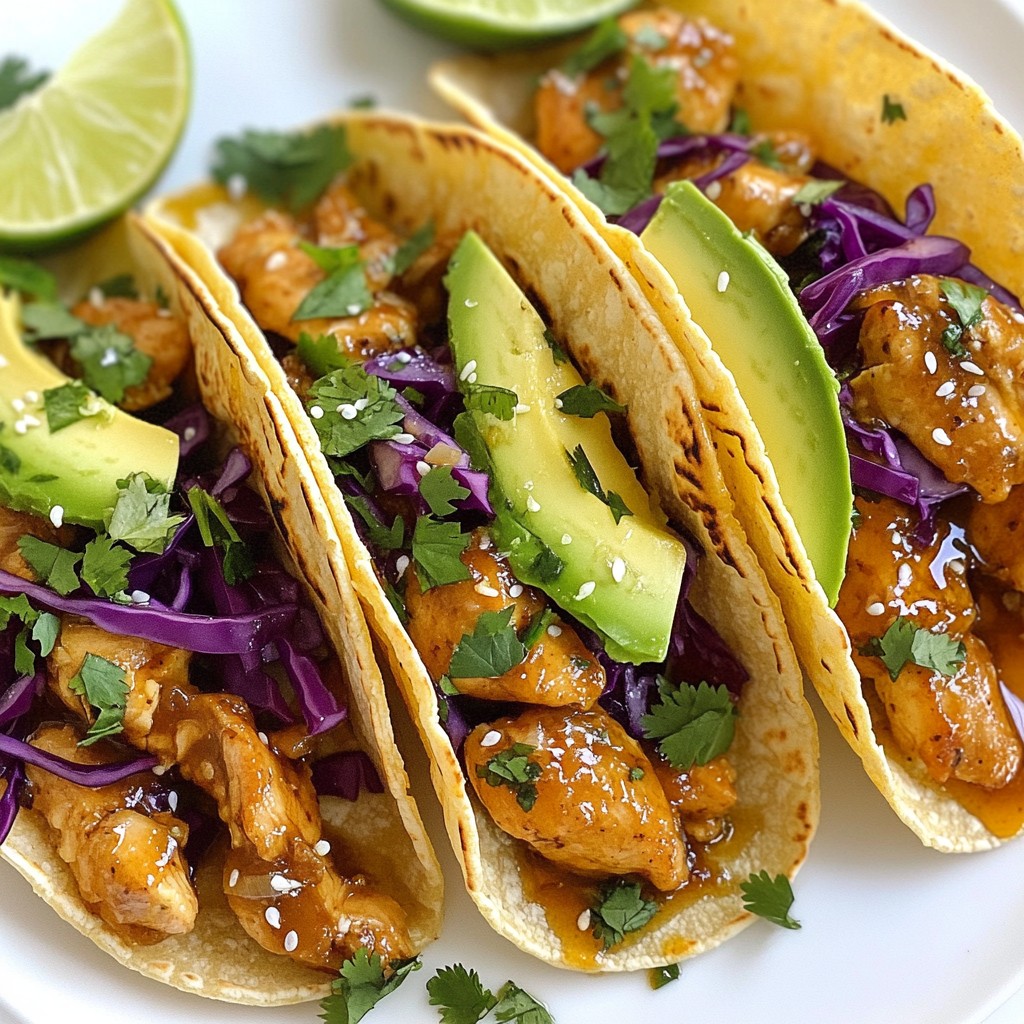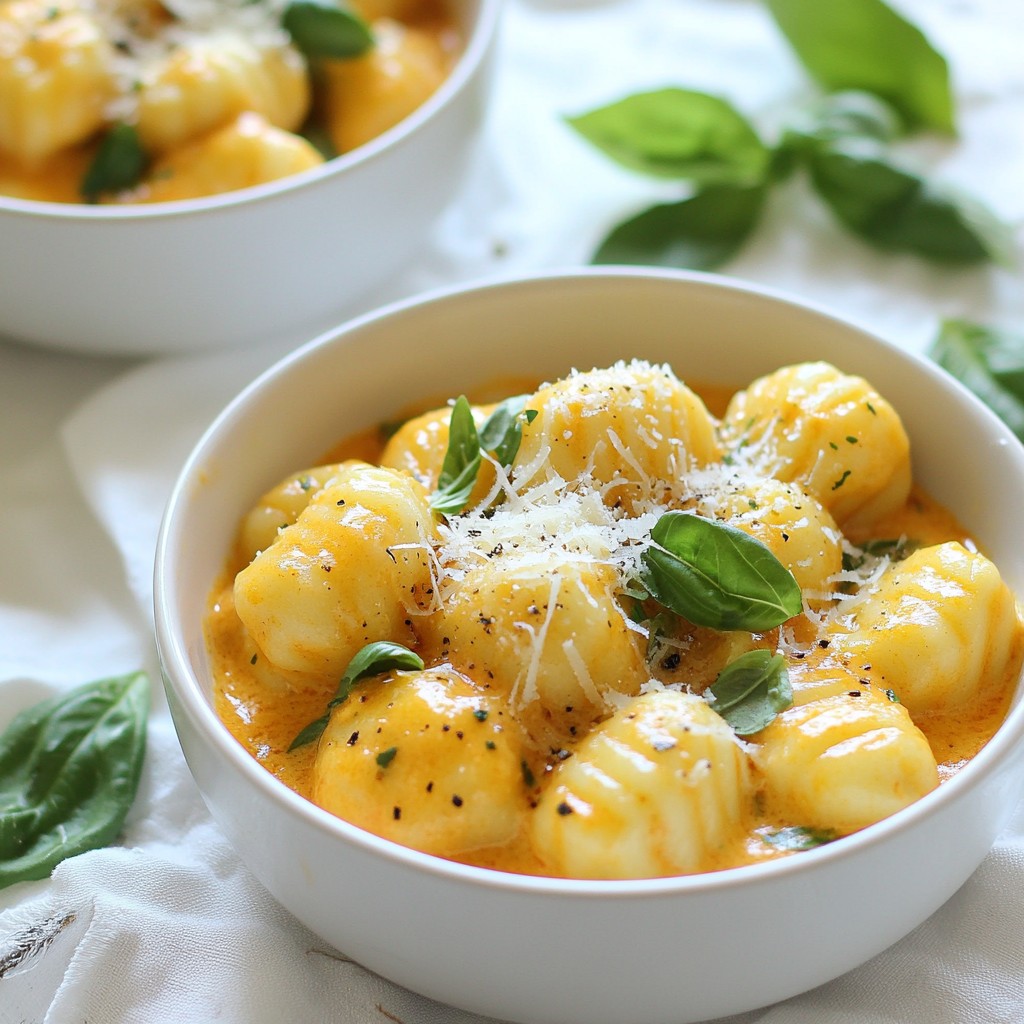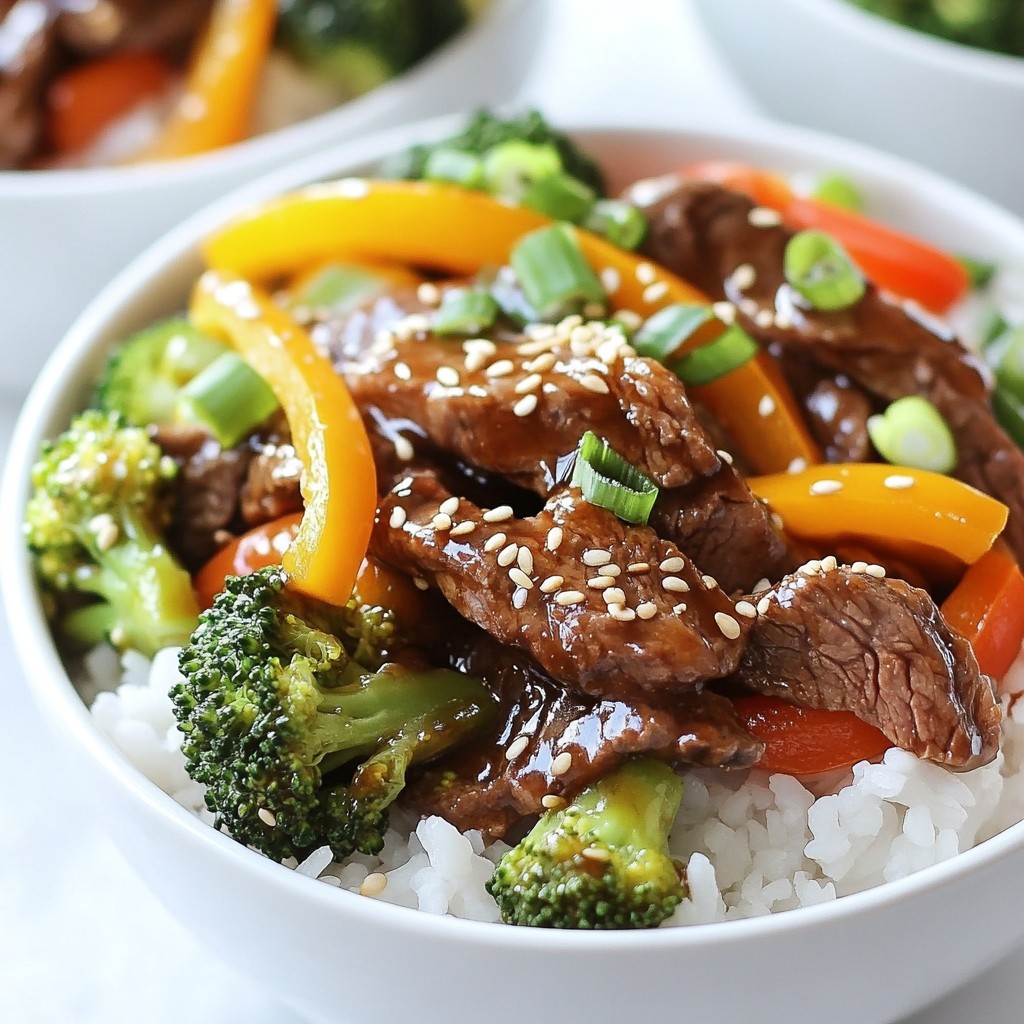Looking for a quick dinner that bursts with flavor? Try this Sheet Pan Orange Glazed Salmon! It combines fresh salmon and bright veggies, all topped with a sweet and savory glaze. This simple recipe not only makes cooking easy but also delivers a tasty meal in no time. Join me as we create a dish that is healthy, vibrant, and perfect for any night of the week!
Ingredients
Main Ingredients for Salmon
– 4 salmon fillets (about 6 ounces each)
– 2 medium oranges (fresh zest and juice)
Salmon fillets are rich in healthy fats. They provide great flavor and texture. Fresh oranges add a bright, zesty taste. Use both juice and zest for the best flavor.
Glaze Ingredients
– 3 tablespoons honey (preferably raw for a richer flavor)
– 2 tablespoons low-sodium soy sauce
– 1 tablespoon extra virgin olive oil
– 3 cloves garlic, finely minced
– 1 teaspoon fresh ginger, grated
– 1 teaspoon toasted sesame oil
– Salt and freshly cracked black pepper to taste
The glaze combines sweet and savory. Honey gives a nice sweetness. Low-sodium soy sauce adds umami. Garlic and ginger bring warmth and depth. Olive oil helps with a smooth glaze.
Vegetable Options
– 1 cup broccoli florets (ideally small-sized)
– 1 cup bell peppers (assorted colors, thinly sliced)
– 1 cup snap peas (trimmed and cleaned)
Choose colorful vegetables for more appeal. Broccoli florets are crunchy and nutritious. Bell peppers add sweetness and color. Snap peas are crisp and fun to eat. They all complement the salmon well.
Step-by-Step Instructions
Prepping the Oven and Baking Sheet
Preheat your oven to 400°F (200°C). While it heats, line a large baking sheet with parchment paper. This makes cleanup easy later.
Preparing the Orange Glaze
In a medium bowl, mix together the juice and zest from the oranges. Add the honey, low-sodium soy sauce, and olive oil. Next, stir in the minced garlic, grated ginger, and sesame oil. Add a dash of salt and pepper. Whisk until it forms a smooth glaze.
Assembling the Dish
Place the salmon fillets skin-side down on one side of the baking sheet. Brush the orange glaze over the tops of the salmon. On the other side, spread the broccoli, bell peppers, and snap peas. Drizzle lightly with olive oil and season with salt and pepper. Toss the veggies to coat them evenly.
Cooking Process
Put the baking sheet in the oven. Roast for about 15-20 minutes. The salmon is ready when it flakes easily with a fork. The veggies should be tender but still have some crunch.
Optional Broiling Technique
For extra flavor, you can broil the dish for 2-3 minutes. This will give the salmon a nice char and caramelize the veggies. It adds a lovely depth to the dish.
Tips & Tricks
Perfecting the Orange Glaze
To make the best orange glaze, start with good honey. Raw honey has richer flavors, which enhances the glaze. It adds a natural sweetness and depth you can’t get from regular honey. For soy sauce, use low-sodium. This option lets you control the saltiness and keeps your dish tasty without being too salty. Mixing these two ingredients with fresh orange juice and zest makes a vibrant glaze.
Best Practices for Cooking Salmon
To check if your salmon is done, use a fork. Gently poke the fish. If it flakes easily, it is ready. For perfect cooking, keep an eye on the time. Roast the salmon for 15 to 20 minutes. If you want a little char, broil it for 2 to 3 minutes at the end. This step gives a rich flavor and nice texture.
Enhancing Vegetable Flavor
To boost the flavor of your veggies, season them well. A sprinkle of salt and pepper works wonders. When you drizzle olive oil, it helps the seasoning stick. Toss the broccoli, bell peppers, and snap peas to coat them evenly. This simple step makes a big difference in taste. For more variety, feel free to add your favorite herbs or spices.
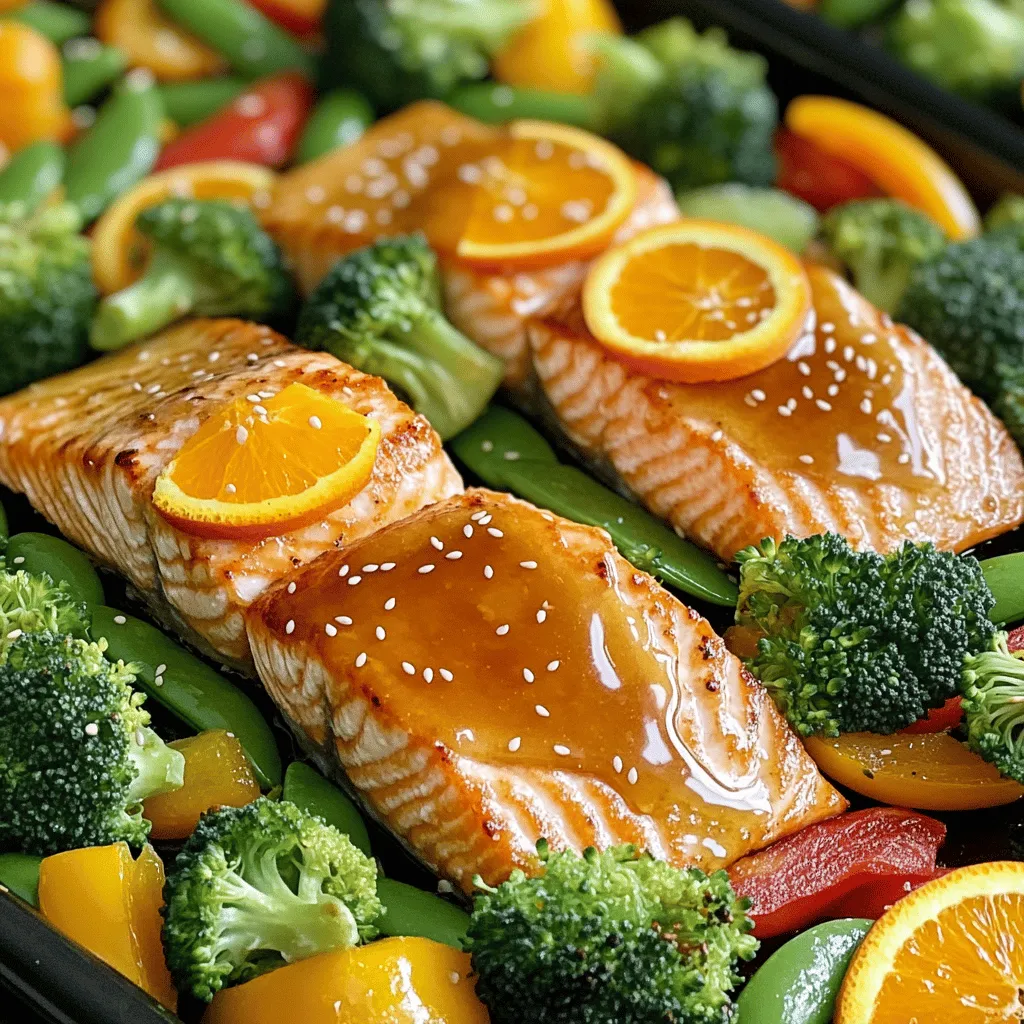
Variations
Alternative Protein Options
You can swap salmon with other fish. Try trout or cod for a fresh taste. Chicken thighs are also a great choice. They soak up the orange glaze well. Just adjust the cooking time to ensure they cook through. Fish cooks fast, but chicken may need a bit longer.
Customizing Vegetables
Use seasonal vegetables for variety. Zucchini, asparagus, or carrots fit nicely in this dish. They add color and flavor, making the meal more exciting. You can mix and match any veggies you love. Just make sure they are cut to a similar size for even cooking.
Spice It Up
Want some heat? Add chili flakes or a dash of hot sauce to the glaze. You can also stir in a bit of sriracha for extra kick. If you like it spicy, feel free to experiment. Adjust the heat to match your taste.
Storage Info
Storing Leftovers
To keep your salmon and veggies fresh, follow these tips:
– Allow the dish to cool for about 30 minutes.
– Use an airtight container for storage.
– Store in the fridge for up to three days.
– Place a paper towel in the container to absorb moisture.
Keeping the salmon away from air helps maintain its taste. The veggies should stay crisp if stored properly.
Reheating Guidelines
When you reheat your salmon and veggies, use these techniques:
– Preheat your oven to 350°F (175°C).
– Place the salmon and veggies on a baking sheet.
– Cover them loosely with foil to avoid drying out.
– Heat for about 10-15 minutes until warmed through.
This method keeps the salmon moist and the veggies crunchy. Avoid using the microwave, as it can make everything soggy.
Freezing Options
Yes, you can freeze cooked salmon! Here’s how:
– Allow the dish to cool completely.
– Wrap the salmon tightly in plastic wrap.
– Place the wrapped salmon in a freezer bag.
– Label the bag with the date and freeze for up to three months.
When ready to eat, thaw overnight in the fridge. Reheat using the guidelines above for the best taste.
FAQs
How do I know when the salmon is done?
You can tell salmon is done when it flakes easily with a fork. The meat should look opaque and bright pink. If it is still translucent in the middle, it needs more time. Make sure to check the thickest part of the fillet. Using a meat thermometer can help too. The internal temperature should reach 145°F (63°C).
Can I use frozen salmon?
Yes, you can use frozen salmon for this recipe. Just make sure to thaw it first. You can leave it in the fridge overnight or use the defrost setting on your microwave. If the fillets are still a bit icy, they may need more cooking time. Keep an eye on them to ensure they cook evenly.
What side dishes pair well with orange glazed salmon?
This salmon goes well with several side dishes. Here are some tasty options:
– Quinoa or rice for a filling base
– A simple green salad for freshness
– Roasted sweet potatoes for sweetness
– Garlic bread for a comforting touch
How can I make this recipe low-carb?
To make this dish low-carb, focus on the veggies. You can skip the honey or use a low-carb sweetener. Replace the soy sauce with coconut aminos for fewer carbs. You can also add more non-starchy vegetables like zucchini or cauliflower.
Can I make the glaze ahead of time?
Yes, you can make the orange glaze ahead of time. Store it in an airtight container in the fridge. It will stay fresh for about three days. Just give it a good stir before using it again. If it thickens, you can add a bit of water to loosen it.
This article explored making orange glazed salmon, focusing on simple ingredients, easy steps, and helpful tips. We covered all you need, from the fresh salmon and orange glaze to perfect cooking methods. Remember, you can customize this dish with different proteins and veggies. Don’t hesitate to tweak the flavors with spices or adjust for low-carb needs. Enjoy cooking and let your taste buds shine with this delicious meal!
